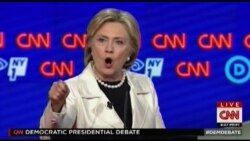Democratic presidential candidates Vermont Senator Bernie Sanders and former Secretary of State Hillary Clinton held a contentious debate Thursday night in familiar territory — Brooklyn, New York ahead of Tuesday's very important New York primary.
The two had a sharp exchange in which they questioned each other's judgment. Sanders, who in recent weeks said he does not believe Clinton is qualified to be president, Thursday said that he accepts that Clinton has the qualifications, but questioned her judgment. He pointed to her support for the war in Iraq and her acceptance of campaign funding from banks and firms on Wall Street.
Clinton accused the Sanders camp of churning out lies about her. Clinton said the people of New York voted her for the Senate twice and President Barack Obama named her secretary of state. She has the judgement, she says, but stressed what she says is Sanders' weakness on foreign policy issues.
She called Sanders' concentration on her accepting large contributions from Wall Street a "phony attack."
Both agreed that banks regarded as too big to fail are a risk to the economy and should be broken up. But they angrily squabbled over raising the federal minimum wage, literally shouting over one another.
Christopher Faricy, assistant professor of political science at Syracuse University, said the debate took the tone that the state of New York is known for.
"They were aggressive, loud, there was sarcasm. So if you didn't know it was in New York, you could kind of tell from the tone," said Faricy.
Both candidates have deep ties to New York. Sanders was born in Brooklyn 74 years ago and still retains his distinctive regional accent from the area. Clinton represented the state as a U.S. senator from 2001 until 2009.
Both candidates have large followings in New York, but polls going into Thursday night debate show Clinton with a double-digit lead over Sanders statewide, with at least one giving her a 17 point advantage. She also has a large lead in the delegate count.
Faricy said the candidates did little to break new ground during the debate. Clinton shone on foreign policy questions, he said, while Sanders fared better on domestic issues, such as economic inequality and universal health care.
Faricy noted that domestic issues are the ones voters tend to pay more attention to, because those are the ones that affect them more personally -- through their families, jobs, or bank accounts.
"Usually, domestic issues win the day. Foreign policy is more complex, it doesn't have an immediate impact on a lot of people's lives. So people usually vote on pocketbook issues," he said.
Sanders has won seven of the last eight Democratic primaries and has been courting minorities and young voters looking to keep the momentum going.






